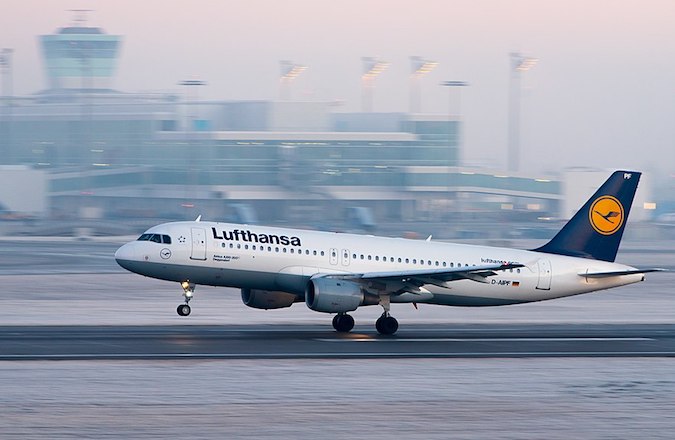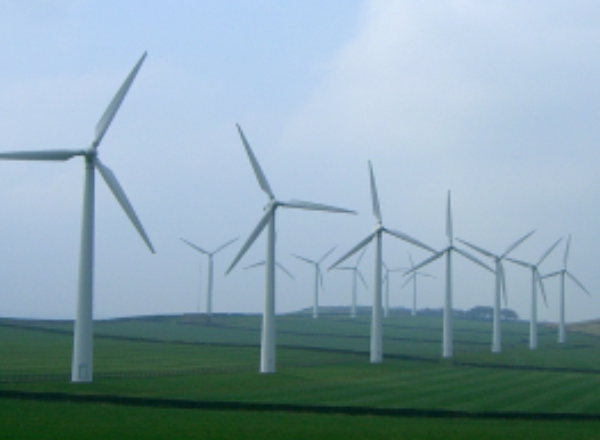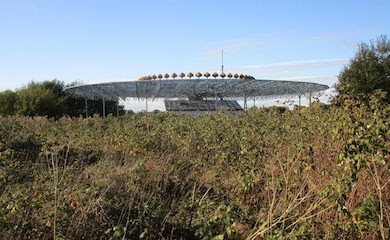Located northeast of the Bavarian capital, Munich Airport is Germany’s second-largest airport (after Frankfurt, for anybody who is curious but doesn’t feel like googling it), coordinating 90 airlines operating across more than 200 destinations in more than 60 countries. It is 51% owned by the Free State of Bavaria with the remaining ownership split almost equally between the Federal Republic of Germany and the State Capital of Munich [1].
Figure 1: Lufthansa Airbus at Munich Airport. [16]
Green Ambitions
Munich Airport presents itself as being very conscious of environmental impacts and sustainability. To that end, the airport has already taken environmentally friendly actions [2] including switching all apron lighting at the airport to LED (along with some other lighting facilities at the airport). In 2021 the airport began work on the conversion of forest areas in the state into “climate forests”, in coordination with the Count of Arco’s forestry administration with the specific goal of capturing more of the carbon dioxide in the atmosphere.
However, last month (November 2023) the airport put out a press release [3] setting out the airport’s intention to reach Net Zero by 2035 instead of 2050 as planned.
What Net Zero Means
Conceptually, Net Zero means that the amount of greenhouse gasses removed from the atmosphere equals the amount emitted due to human activity. The process for individual companies to achieve Net Zero is as follows.
Greenhouse gasses are those emissions that contribute to the ‘greenhouse effect’ i.e. the warming of the planet’s surface temperature. Greenhouse gas emissions from a company are often looked at in three [4] categories:
- Scope 1 Emissions: Directly resulting from company operations. An example would be fuel burned within company vehicles.
- Scope 2 Emissions: Indirectly resulting from company operations, specifically its energy supply. An example would be emissions generated by purchased electricity.
- Scope 3 Emissions: Indirectly resulting from company operations in other ways i.e. everything other than Scope 2. An example would be indirect emissions associated with a company’s purchased goods.
Scope 1 and 2 are considered the emissions that the company itself, in this case Munich Airport, can influence. To achieve Net Zero, Munich Airport must:
- Reduce Scope 1 and Scope 2 emissions by at least 90%.
- Offset the remaining 10% by removing an equivalent amount of greenhouse gasses elsewhere.
What Munich Airport is Doing Specifically
In early December, Munich Airport had to cancel and suspend flights entirely due to mammoth snowfall [5], followed by a slightly chaotic resumption of operations thereafter [6]. While immediate cessation of operations probably does give rise to a sharp reduction in emissions, it is probably not a strategy that shareholders will get behind in the long term. Fortunately, a more business-friendly approach is in the works.
Munich Airport’s plans include actions across four areas:
- Energy supply: including expanding photovoltaics around the airport.
- Technical airport facilities: including installing more efficient baggage transportation system motors.
- Real estate: including low energy consumption for new buildings.
- Mobility: including conversion of the vehicle fleet to electric vehicles.
Capturing the remaining 10% appears to be targeted via the climate forest initiative mentioned above.
Green Energy in Germany
Last month saw a shockwave in Germany’s green energy finances, when the country’s constitutional court ruled that the government’s planned transfer of €60 billion to the climate and transition fund was unlawful [7]. The intention was to use that money for various initiatives including renewable energy subsidies [8].
The backdrop of this recent blow to Germany’s green agenda is itself rather gloomy. This year (2023) saw the cessation of energy production from nuclear power plants in the country [9], which delivered on Berlin’s commitment in 2011 to phase out nuclear energy in the country. While this was a longstanding commitment, made in the wake of the Fukushima disaster, it did raise eyebrows even among green energy supporters [10], seen by some as premature and inappropriate.
More generally, the European Policy Centre considers Germany to have under-invested in, among other things, infrastructure, renewables and digitalisation over the last ten years to the tune of a staggering 300 billion Euros [11].
Lastly, Germany has a longstanding dependence on Russia for gas [12]. The Ukraine war is, therefore, a double-edged sword in the context of Germany’s green energy plans. While some suggested the conflict would serve as an accelerator for Germany’s green energy transition, the immediate impact was a decision to reconnect coal-fired power plants in the country [13].
It remains to be seen if the country finds a good solution on a federal level in the wake of the court ruling, however the Organisation for Economic Cooperation and Development has predicted a negative impact on the growth of the economy [14], which will not make things easier for Berlin.
Notwithstanding these challenges, Germany has managed to realise a number of notable achievements as regards green energy. For example, in 2022, renewable energy provided 46% of electricity consumption (compared to 6.3% back in 2000) [15]. Milestones reached along the way are covered elsewhere on this website (an example is here). We can only hope that the energy transition remains near the top of the country’s list of priorities even in the current climate.
Pager Power
Pager Power has been supporting renewable energy and building developers for over 20 years.
Sustainability ambitions at airports specifically is a relatively recent trend. It is an exciting element of global drives towards sustainability in particular because:
- Air travel is a source of pollution, but as an industry it is embedded into our way of life, particularly in the industrialised world.
- Airports own a lot of real estate, which gives them high potential for a range of sustainability projects.
- Airports have a lot of money, such that realising such projects privately or with varying levels of state support is viable.
Pager Power is proud to have supported various international airports with their sustainability projects, including cases in Western Europe, Scandinavia and Asia. Further information can be seen on our projects page and among our partial list of clients.
If you would like to speak to us about your projects and what we can offer, please do not hesitate to contact the team.
References
[1] Source: Munich Airport website (link), last accessed December 2023.
[2] Source: Munich Airport Website (link), last accessed December 2023.
[3] Source: Munich Airport Press Release (link), last accessed December 2023.
[4] Carbon Chain (undated), Scope 1, 2 and 3 emissions (link), last accessed December 2023.
[5] Reuters (December 2023), Munich flights, trains cancelled as heavy snow blankets Bavaria (link), Reuters, last accessed December 2023.
[6] Wright, R (December 2023), Munich airport resumes flights but issues warning to passengers (link), Euronews.
[7] Steitz and Blasshofer (December 2023), German budget crisis ‘stings’ already weak economy – ZEW president (link), Reuters, last accessed December 2023.
[8] Martinez and Kraemer (November 2023), German court deals 60 billion euro budget blow to Scholz government (link), Reuters, last accessed December 2023.
[9] Federal Office for the Safety of Nuclear Waste Management (undated), The nuclear phase-out in Germany (link), Last accessed December 2023.
[10] Clifford (April 2023), Germany has shut down its last three nuclear power plants, and some climate scientists are aghast (link), CNBC, last accessed December 2023.
[11] 2023Lausberg, P (November 2023), German court ruling threatens to unravel Europe’s green and industrial ambitions (link), European Policy Centre. Last accessed December 2023.
[12] Sullivan, A (September 2022), Russian gas in Germany: A 50-year relationship (link), DW, last accessed December 2023.
[13] Reuters (July 2022), Ukraine conflict could speed up Germany’s green energy transition, study says (link), Reuters, last accessed December 2023.
[14] Reuters (November 2023), German GDP to expand in 2024, but court ruling could lower growth – OECD.
[15] Umweld Bundesampt (November 2023), Renewable energies in figures (link), last accessed December 2023.
[16] Julian Herzog, Lufthansa Airbus A320-211 at Munich Airport (2015) from Wikicommons. Last accessed on 8th December 2023. Available at: https://commons.wikimedia.org/wiki/File:Lufthansa_Airbus_A320-211_D-AIPF_MUC_2015_01.jpg




